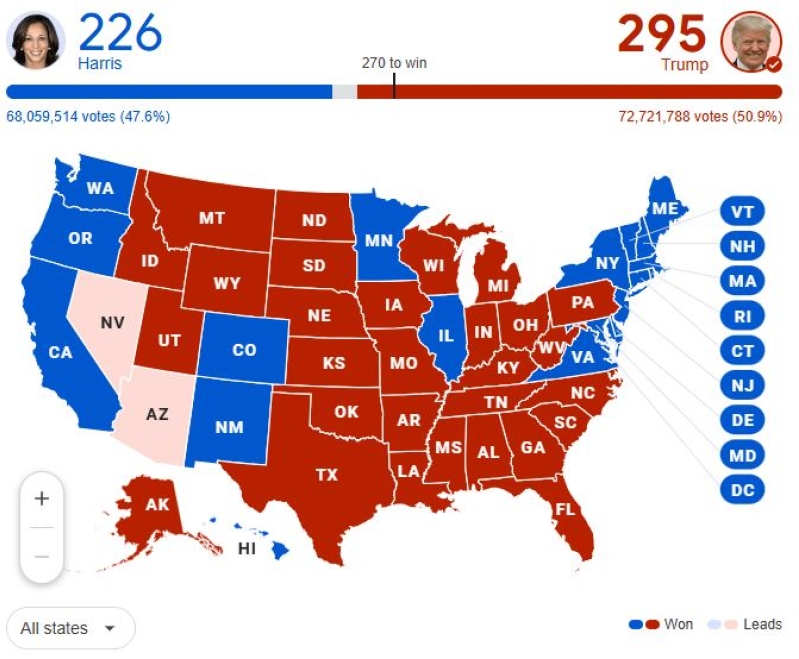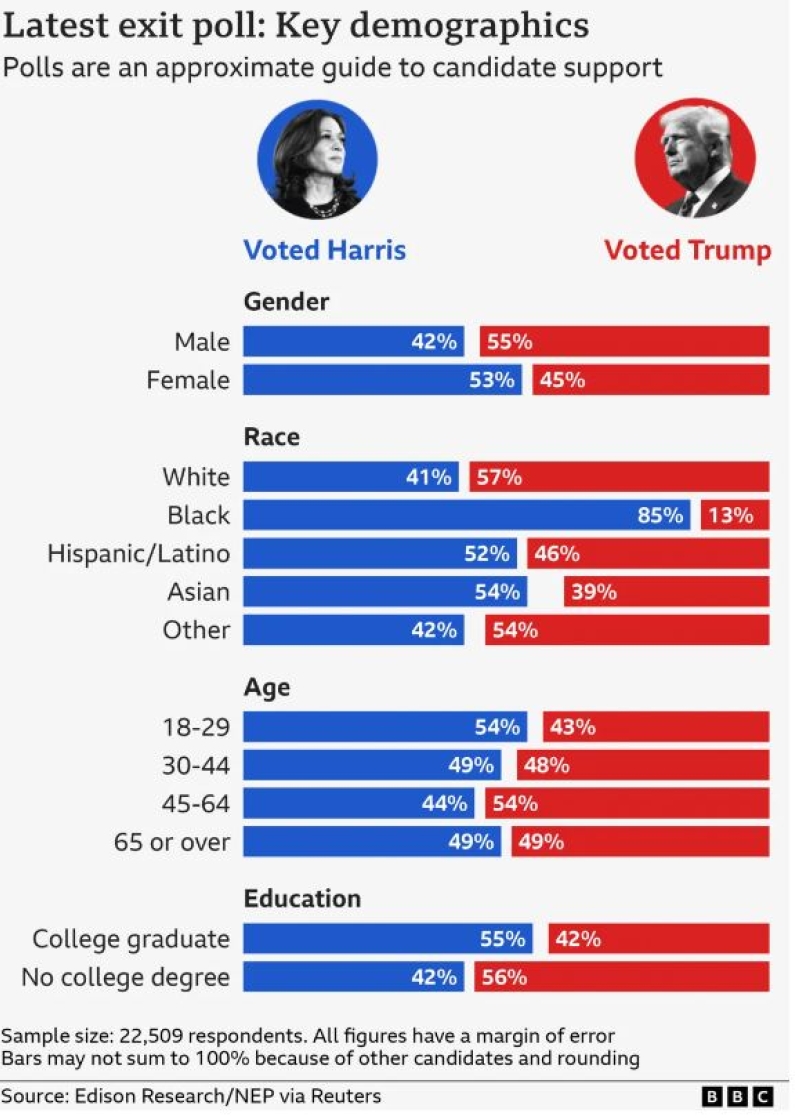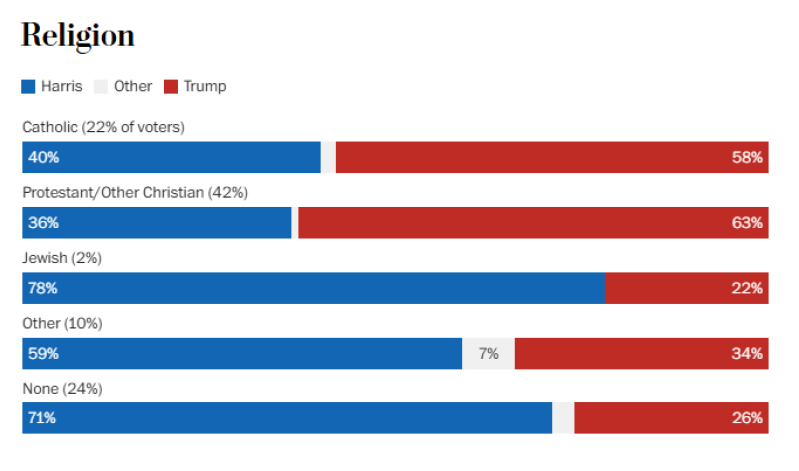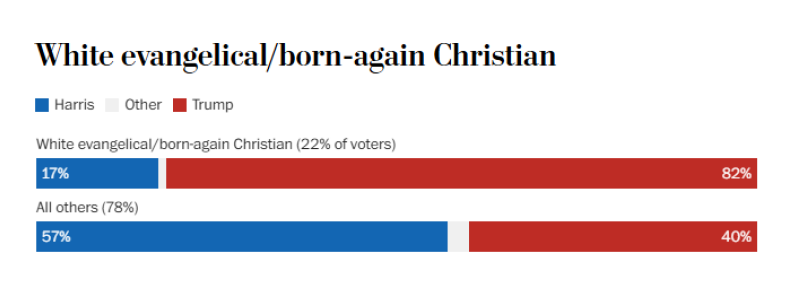Religious factors have shown their significance in the recently called 2024 U.S. elections. Support from the Evangelical Christians have proven critical to Trump’s reelection. Dr. Fenggang Yang (杨凤岗), professor of Sociology of Religion at Purdue University, pointed this out in a recent discussion amongst Chinese pastors.

On November 6, after the election winner was announced, Dr. Yang presented the latest exit poll data in an online program hosted by Rev. Boli Zhang (张伯笠) on his YouTube channel, which was streamed live at 9PM. The session also brought in Rev. Stephen Chen (陈佐人) and Rev. Zhiyong Wang (王志勇) to discuss post-election pastoral care for Chinese Churches.
Yang first pointed out that the pre-election polls were far off from the actual results. Pre-election polls showed a razor thin race, especially in the swing states, but the actual votes showed surprisingly great discrepancy. He also pointed out that there have been major problems with the pre-election polls the past eight years. While pre-election polls have various issues, the post-election exit polls provide more insightful data. Yang used this opportunity to say that social sciences must reflect on themselves and use more effective methods to understand society as a whole.

Data Analysis of Exit-Poll Data
Interestingly enough, BBC was the first to publish data from U.S. election exit-polls. Within the data, the importance of religious factors in voter choice stood out significantly. According to the survey, which was conducted jointly by a number of media outlets, the data showed that 54% of male voters and 44% of female voters voted for Trump. Racially, 55% of Whites, 12% of Blacks, 45% of Latinos, and 38% of Asians voted for Trump.
Among the different age groups, 42% of voters under 30 voted for Trump, along with 46% among those 30-44, 53% among those 45-64, and 49% of those over 65. Additionally, 41% of college-educated voters supported Trump.
Among the religious demographic, 62% of Christians supported Trump, alongside 56% of Catholics and 21% of Jews. Yang noted that while Jews have traditionally supported the Democratic Party, many Catholics and Christians switched to the Republican Party this election.
A particularly noteworthy statistic comes from evangelical Christians. 81% of white evangelical Christians voted for Trump this year, a large component of what won him the election. This data suggests that religious factors, particularly the support of evangelical Christians, were crucial to Trump’s victory.
Yang also compared this year’s data from the last election. He points out that more Catholics voted Republican this year while most backed Biden last time. Yang believes that, although Biden himself is a practicing Catholic, regularly joining Mass, his stance on homosexuality and abortion have made him unpopular amongst the clergy. He cited the incident where a priest had refused to give Biden communion.
Changes in Religion and Politics
Yang points out that starting 2000, Catholics have gradually sided more with the Republican Party, a trend verified this election. Other factors influencing voter outcome this year include race, class, and gender. Yang mentioned that Latino voters and young first-time voters made unexpected choices, most of them supporting Republicans. A considerable number of female voters also voted republican, despite the Democrat’s high-profile emphasis on women’s rights protection in the Harris-Waltz campaign.
Yang concluded that the election showed that the importance of the religious factor was once again validated and that the influence of evangelical Christians cannot be ignored.
A new phenomenon seen in this year’s election season is the rising amount of evangelical pastors speaking out and calling their congregation to vote.
Pastor Gary Hamrick’s sermon earlier this season explicating the social responsibility American Christians carry to their country in their votes have amassed millions of views on Youtube. Franklin Graham, son of Billy Graham, has also publicly voiced support for Trump. Rev. Boli Zhang has also spoken extensively on the election to Chinese American audiences. Additionally in the past month, he has held 17 global online fasting and prayer meetings for the election, all streamed on his YouTube channel.
Exit Poll Report from the Washington Post:
The exit poll results published by the Washington Post reveals this also.


Early exit polls show that Trump garnered significant support from Catholic voters, leading Harris by nearly 20 points—a shift from 2020 when Catholics favored Biden, America’s second Catholic president, by five points. Catholics accounted for over 20% of voters in both elections. Meanwhile, Protestant voters, who made up around 40% of the electorate, showed similar patterns to 2020, with roughly 60% backing Trump. About a quarter of voters reported no religious affiliation, favoring Harris by a nearly 3-to-1 margin, surpassing Biden’s 2020 support. Trump’s strongest backing came from White born-again Christians, who constituted around 20% of voters, with 80% supporting him—an increase from his 76% support in 2020.






